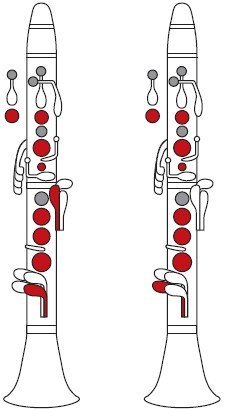When clarinetists talk about scales, they often mention the common ones like the major or minor scales. But what about the G# Whole-Half Diminished Scale? It's one of those hidden gems that has so much history and significance, especially in clarinet music! Let's explore this unique scale together.

Clarinet Fingering Charts are always FREE at MartinFreres.net!
The G# Whole-Half Diminished Scale is a sequence of alternating whole steps and half steps, starting from G#. This pattern gives it a unique sound that's hard to replicate with other scales. It's not a new invention; its roots go back to the early 20th century and it's found in various genres, particularly jazz and contemporary classical music.
Jazz Improvisation and the G# Whole-Half Diminished Scale
In jazz, this scale is a favorite among improvisers. Saxophonists and trumpet players often use it, but the clarinet also shines with these fast and intricate notes. The clarinet's ability to hit high pitches smoothly makes it perfect for this scale, showcasing the instrument's versatility.
Picture a lively jazz ensemble: as a saxophonist plays a spirited solo, the clarinet can glide in with a smooth line using the G# Whole-Half Diminished Scale, enhancing the underlying harmony. This scale allows musicians to express tension and release, perfectly complementing the energetic jazz vibe.
The G# Whole-Half Diminished Scale in Classical Music
You might be surprised to learn how this scale is used in classical music. Contemporary composers have blended it with traditional structures, creating innovative pieces that challenge our understanding of tonality. Many modern clarinetists explore its use in extended techniques during performances.
| Genre | Use of G# Whole-Half Diminished Scale |
|---|---|
| Jazz | Improvisation, creating tension and release |
| Classical | Contemporary compositions, extended techniques |
Fostering Musical Improvisation
The G# Whole-Half Diminished Scale plays a crucial role in musical improvisation. When clarinetists incorporate this scale in group settings, it opens up new possibilities for notes and encourages interaction among musicians. It's like planting seeds in a garden: each player contributes their unique style, resulting in a rich, textured performance.
Developing Listening Skills
One beautiful aspect of this scale is how it teaches clarinetists to listen. It's not just about playing the notes; it's about understanding where those notes lead. This approach helps develop musicality, allowing you to feel the music while remaining attentive to harmonies and melodies at the same time.
Tips for Practicing the G# Whole-Half Diminished Scale
Here are some practical tips to help you incorporate the G# Whole-Half Diminished Scale into your practice routine:
- Start Slow: Take your time initially. Don't rush through the scale; let each note resonate. Feel the vibrations and how they connect.
- Use a Metronome: Once you're comfortable, gradually increase the speed with a metronome. This will help build your confidence and precision.
- Play Along with Backing Tracks: Use backing tracks in jazz and contemporary music that allow for improvisation. Experiment with fitting the G# Whole-Half Diminished Scale over various chords.
- Record Yourself: Recording your practice sessions helps you hear how you sound and make necessary adjustments.
- Improvise Freely: Once you're comfortable with the scale, start creating melodies using its notes and intervals.
Conclusion
The G# Whole-Half Diminished Scale is more than just another scale for clarinetists; it's a piece of musical history that reflects diverse musical styles. Its important role in both jazz improvisation and contemporary classical composition shows how music continues to evolve. Every time we play this scale, we honor those who developed not just the scale, but the clarinet itself. Companies like Martin Freres have been instrumental in preserving this rich musical heritage. So the next time you pick up your clarinet, remember the depth and history behind the scales you play, and let them inspire your musical journey!







